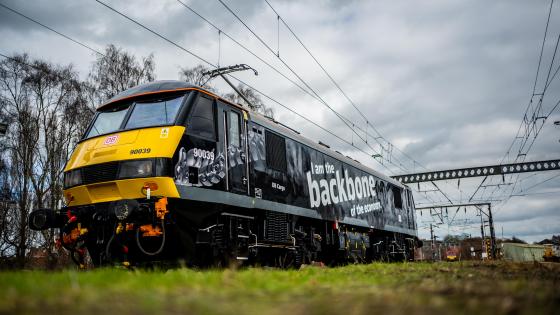
The Rail Delivery Group says the social and economic benefits of rail freight to the United Kingdom are worth £2.5 billion a year, and that a single freight path can be worth up to £1.5 million a year.
The findings are contained in an independent report by Deloitte, which estimates direct benefits of more than £1.65 billion for customers of rail freight, and another £800 million in wider benefits to society and the environment by removing seven million lorry journeys from the road network. Cost savings driven by higher maximum speeds of rail freight, associated time savings and reliability benefits are cited as being important for customers. Reduced road congestion, carbon emissions and cuts in the frequency and severity of road accidents are the main social benefits.
Almost all benefits are outside London and the South East, with Yorkshire and the Humber gaining £860 million, the East Midlands £375 million, Wales £260 million, North West England £225 million and the East of England £190 million.
Deloitte’s report also argues that rail freight enables a better logistics system for towns and cities, particularly for construction materials. It also allows for more efficient and integrated supply chains with logistics hubs such as Doncaster iPort and the East Midlands Gateway serving companies such as Maritime, DHL, Ikea, and Amazon, as well as manufacturers including Nestle and Fellowes.
The existing environmental benefits of rail freight are set to increase as more routes are electrified, and intermodal and construction traffic increasingly switches from road to rail. An increase in the level of carbon prices used to value emissions saved would also, Deloitte argues, increase the monetised value of rail freight’s environmental benefits.
To maximise future benefits, the report calls for investment to deliver infrastructure changes to accommodate freight and stimulate private sector in locomotives, rolling stock and freight facilities. Support for modal shift from road is needed, with intermodal, construction, parcels, and light logistics offering high potential to achieve carbon emission cuts by moving traffic from road to rail. Capacity optimisation is also called for to create freight paths at new and different times to allow faster and more non-stop running with less looping of freight trains. This would expand volumes carried and sectors served by making journey times faster and more reliable. Allied with train lengthening, more materials could be carried.
Case studies by Deloitte suggest an off-peak semi-rural intermodal train is likely to deliver £1.3 million of benefits for year, against just £170,000 for an off-peak passenger train. In urban areas, a peak time passenger train is valued at £5.3 million a year, freight £1.2 million and off-peak passenger £30,000. Running longer intermodal trains increases the freight value in that scenario by £300,000 per year.
